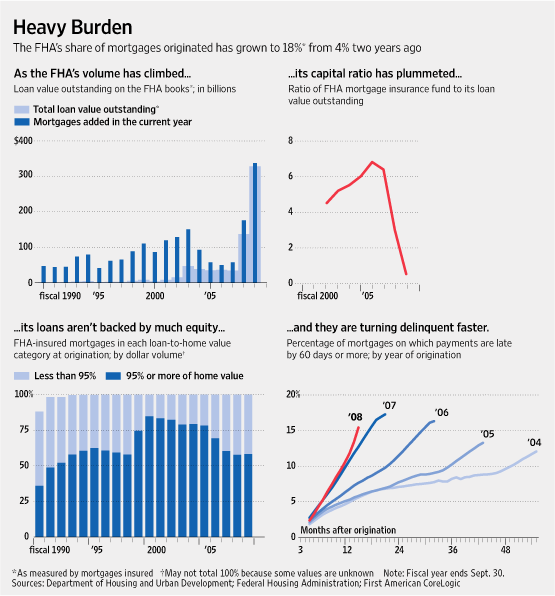Earlier this week, it was announced that the FHA’s insurance reserves have fallen below the benchmark 2% level of insurance commitments. In fact, it is now only .53%, and some analysts are suggesting that it could soon fall below zero, necessitating a government bailout.
It is not difficult to understand why the FHA’s reserves are falling. You can see from the excellent flowchart below (courtesy of the Wall Street Journal), that in the wake of the housing crisis, the FHA is involved in a growing portion of mortgage lending. In fact, FHA loans now represents nearly 25% of all new mortgages. Moreover, a high proportion of these loans are secured by very little equity- less than 5% in the majority of cases. As a result of the concurrent economic downturn, meanwhile, loans are souring at a faster rate, and the ratio of delinquent 2007 loans has surpassed the percentage of 2004 loans that are delinquent. “Nearly one in five loans it insured in 2007 falls into the category of ‘seriously delinquent,’ ” the agency admitted.

Shaun Donovan, Secretary of the Department of Housing and Urban Development (a Cabinet-level position) has insisted that the agency will remain solvent, and that in fact, its reserves could return the 2% level as soon as fiscal 2012. “In line with many analysts, the agency expects the housing market to turn down again over the next nine months and then to recover. Under this projection, foreclosures would be manageable and the reserves would quickly grow.” Nonetheless, he has delayed the release of the annual FHA audit so that more downside forecasts can be conducted, and included in the report.
Congress isn’t exactly buying this self-declared prognosis. “Rep. Scott Garrett (R., N.J.) introduced a bill last month that would raise minimum down payments to 5%, something that the agency opposes. ‘Others are beginning to see that this could be the next major bailout,’ he said.” Still, the agency is insisting both on its autonomy and its ability to survive this minor crisis unscathed.
It’s unclear how the reverse mortgage program will be affected. The FHA has already lowered the size of maximum allowable mortgages, as a percent of the value of the collateral housing. Shortly thereafter, it paradoxically raised the overall allowable mortgage to $625,000. According to the FHA, “This year, for the first time, we have added an actuarial study of the FHA reverse mortgage, or HECM, program, to the principal study of standard FHA single-family insurance programs supported by the Fund.” Since the report’s release has been delayed, we will have to wait to see whether the reverse mortgage program is in the same dire-financial straits as its conventional mortgage lending program.
Given that home prices have declined so precipitously and that reverse mortgage defaults are also rising, it seems likely that its reserves set aside for reverse mortgage lending are probably proportionately low. At the very least, lending standards will have to be tightened, and perhaps insurance premiums will have to be raised. Naturally, these costs will be passed on to the borrower. If you’re thinking about a reverse mortgage, then, this could be your last chance for a while to get in at good terms.
One Response to “How will the FHA’s Financial Troubles Affect Reverse Mortgage Lending?”
Have Feedback on This Article?

November 26th, 2009 at 8:28 am
[…] a post that now looks prescient, I reported recently on the FHA’s Financial Troubles (”How will the FHA’s Financial Troubles Affect Reverse Mortgage Lending?“) and wondered aloud about the potential impact on the reverse mortgage industry (which […]